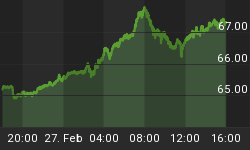This past Sunday on the CBS program "60 Minutes", Americans received a massive dose of mendacity from our Fed Chairman. Mr. Bernanke's shaky delivery, and even shakier logic may cause faith in America's economic leadership to evaporate faster than the value of our dollar. In particular, Bernanke delivered two massive distortions:
Lie #1 - The Fed isn't printing money. Bernanke stated: "The amount of currency in circulation is not changing...the money supply is not changing in any significant way. What we're doing is lowering interest rates by buying Treasury securities." Given that it is the Treasury Department's Bureau of Engraving and Printing, not the Fed, that actually prints paper money, his statement is technically correct while substantively false. However, Bernanke is buying bank assets with Fed credit. With such an arrangement, printing becomes unnecessary.
According to gentle Ben, credit created to buy something should not be considered money and has no affect on asset prices? But if that's true, why is he concentrating his buying in the middle of the Treasury yield curve. His stated purpose is to boost bond prices and lower yields in order to stimulate borrowing and aggregate demand. So pushing up bond prices is an act of inflation. Bernanke similarly contradicts himself by saying that he isn't creating inflation, while at the same time claiming that his easing campaign is designed to boost asset prices to combat the phantom of deflation.
And by the way, the Fed is causing money supply to increase significantly. The compounded annual growth rate of M2 is over 7% in the last quarter. Apparently in the eyes of the Chairman, a 7% annualized increase in the broad money supply isn't considered significant.
Lie #2 - Bernanke is "100 % confident" that, when necessary, the Fed can control inflation and reverse its accommodative monetary policy. He stated, "We've been very, very clear that we will not allow inflation to rise above 2 percent. We could raise interest rates in 15 minutes if we have to. So, there really is no problem with raising rates, tightening monetary policy, slowing the economy, reducing inflation, at the appropriate time." He failed to mention that the Fed doesn't have the will to drain money from the system, without which all tools are useless. The Fed has consistently demonstrated its unwillingness to take the appropriate actions when necessary. In claiming he is 100% confident in his ability to control inflation, Mr. Bernanke ignores the record that during his tenure he has misdiagnosed the economy.
In June of 2006, Bernanke culminated his inflation fighting efforts by raising the Fed Funds target rate to 5.25%, after CPI inflation reached 4.2%. But that interest rate was enough to help burst the housing bubble and to spark an international credit crisis. Bernanke was completely unaware that the Fed actions had created an economy that had become completely addicted to artificially-produced low interest rates and inflation.
Shortly after the collapse of the real estate market and the ensuing truncated deflationary-depression, Bernanke took interest rates to near zero percent. But if the Fed was ever really serious about unwinding excessive leverage, the time had clearly arrived. Instead, the U.S. economy has become more addicted to free money than at any other time in our history.
Commodity prices are soaring once again and the real estate market, banking sector, and the overall economy cling precariously on the arm of government induced bailouts and low interest rates. Even worse, our government has massively increased its level of debt, which now stands at just below $14 trillion. Once the rate of inflation eclipses the Fed's 2% target rate, which appears likely, how then will the Fed raise rates to contain it? Could the economy then withstand an increase in the cost of home ownership? Most importantly, when will Mr. Bernanke find it politically tenable to dramatically increase debt service payments for the Federal government? In truth, there is never a convenient time to have a severe recession or a depression. Unfortunately, reality can be extremely inconvenient.
Bernanke was accurate in saying that the economy is not expanding at a sustainable pace. Of course, his prescription was the same as it always is; print more money in the misguided belief that inflation will lead to growth. As such, he indicated that it's possible that the Fed may actually expand bond purchases beyond the $600 billion announced last month. (Remember that the $600 billion comes after the $1.7 trillion that has already been printed, which failed to produce anything much beyond a weaker dollar). Therefore, the country can look forward to yet more inflation, continued anemic GDP growth, a poorer citizenry, and a vastly lower standard of living.
On the bright side, the next segment on 60 Minutes outlined some of the new social networking capabilities being created by Mark Zuckerberg and Facebook. In other words, although our economic misery will likely increase, it should become much easier to share the bad news with friends.
For in-depth analysis of this and other investment topics, subscribe to Euro Pacific's Global Investor Newsletter. Click here for your free subscription.
Click here to download Euro Pacific's Special Report: Peter Schiff's Five Favorite Gold & Silver Mining Stocks.
Be sure to pick up a copy of Peter Schiff's hit economic fable, How an Economy Grows and Why It Crashes.















